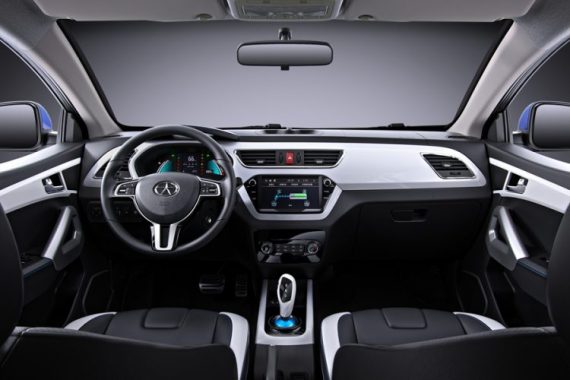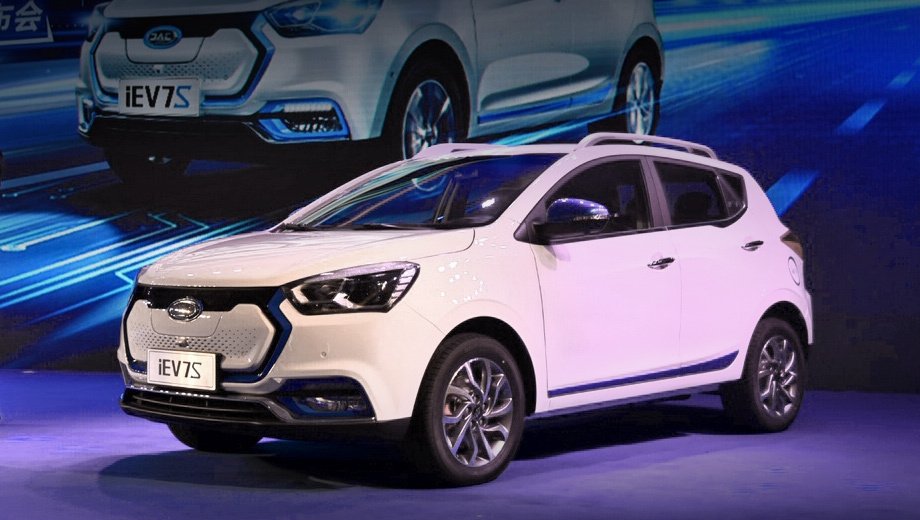An eco-friendly electric car assembled in Kazakhstan, known as the iEV7S, is making its debut at the 2018 Moscow International Auto Show, which is running in Russia’s capital from August 29 through September 9.
Unmanned taxis and shuttles are a feature of this year’s show, and a pavilion of ‘new generation’ vehicles includes Kazakhstan’s iEV7S – the first serial electric car manufactured within the Eurasian Economic Union.
“The car is currently being certified, and the deadline for certification is mid-to-late September,” Marat Bisenbaev, a company representative, said according to reports by Atameken Business Channel.
“We can launch the first sales from September to November in Russia and all [Commonwealth of Independent States] countries,” Bisenbaev explained, referring to the former Soviet republics. “The plant’s capacity is large – about 120,000 [vehicles] per year. For the first sales, we expect [to produce] around 50-100 vehicles.”
Now in its thirteenth year, the Moscow International Auto Show features new products from China and South Korea as well as the Caspian region. Despite the interest of Asian companies, nearly 30 brands, including Mercedes and BMW, have refused to join this year’s exhibition due to sanctions on Russia and a drop in the Russian automobile market.
China’s JAC Motors produced the iEV7S, which is equipped with a 113 horsepower engine that can reach 130 km per hour (80 mph). The fully-electric car can run up to 280 km (173 mi) on average, and features a fast charge mode, meaning the car battery can be almost fully charged within an hour. The battery’s life can last up to 350 km within a single charge if the car moves no faster than 60 km per hour. The vehicle is ‘all weather’, meaning it is operational in temperatures as low as -27 degrees Celsius. The model costs anywhere from $18,054 to $31,258, depending upon customized features.

JAC Motors, a Chinese state-owned automobile and commercial vehicle manufacturer, has been active in Kazakhstan since 2015, when the company signed an agreement with Kazakhstan’s AllurGroup to invest $6.8 billion into the local car market. In 2017, China National Vehicle Import and Export Company signed an agreement to purchase a 51 percent stake in Kazakhstan’s AllurGroup.
According to the deal, JAC Motors provides Kazakhstan with the “car kit sets” and provides Kazakhstan with the right to manufacture and export JAC branded cars.
Founded in 1964, JAC Motors is among top 10 Chinese car manufacturers and listed as one of the 100 leading industrial enterprises in the world. The company annually produces more than 700,000 cars, crossovers and trucks.
Kazakhstan has been manufacturing iEV7S since March of this year at a plant in Kostanay, a city in the northern corner of Kazakhstan. Over the past two years, the plant has produced 27 electric vehicles of five different JAC models: EV4, EV5, EV6S, EV6E, and EV7. Following test drives, the mini-crossover dubbed iEV6S proved to be the best.
“Of five tested models, EV6E showed the best results as it fit Kazakhstan’s climatic and landscape conditions best of all,” the press service of the AllurGroup reported earlier this year.
In October 2017, this model was replaced by the improved iEV7S, which meets the requirements of the technical regulations of the EU and the Customs Union and can be exported to these countries.
Manufacturers of the electric cars say that in the coming years it will be difficult to find customers in Kazakhstan. In 2017 Kazakhstanis bought only 19 electric cars manufactured by Tesla, Toyota, Renault, and Chevrolet, according to the AllurGroup.
“Demand for these cars is just starting to emerge,” the company says.
Currently, the main targets are Astana and Almaty. Charging stations are located throughout the areas between the cities, as well as inside of them.







 President Ilham Aliyev shed light on the evolving contours of the peace process with Armenia during an international conference in Baku this week. ...
President Ilham Aliyev shed light on the evolving contours of the peace process with Armenia during an international conference in Baku this week. ...
 Azerbaijan and Armenia started the process of demarcation of their border on Tuesday, with the installation of the first border markers based on ge...
Azerbaijan and Armenia started the process of demarcation of their border on Tuesday, with the installation of the first border markers based on ge...
 President Aliyev emphasized the critical role of the North-South Transport Corridor in fostering transport cooperation between Azerbaijan and Russi...
President Aliyev emphasized the critical role of the North-South Transport Corridor in fostering transport cooperation between Azerbaijan and Russi...
 Russian Foreign Minister Sergei Lavrov has reasserted that Moscow has no intentions to stop the fighting in Ukraine, even if peace talks commence.
Russian Foreign Minister Sergei Lavrov has reasserted that Moscow has no intentions to stop the fighting in Ukraine, even if peace talks commence.
 Iran has refuted reports of alleged damage to Shimon Peres Negev Nuclear Research Centre located southeast of Dimona, Israel, during the recent air...
Iran has refuted reports of alleged damage to Shimon Peres Negev Nuclear Research Centre located southeast of Dimona, Israel, during the recent air...
 Iran and Pakistan have signed eight cooperation documents in various fields, and agreed to strengthen ties to fight terrorism in the region.
Iran and Pakistan have signed eight cooperation documents in various fields, and agreed to strengthen ties to fight terrorism in the region.



